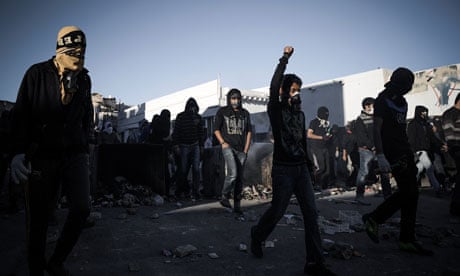Bahraini security forces have fired teargas, rubber bullets and birdshot at demonstrators hurling rocks and Molotov cocktails in street battles that left one teenager dead and dozens more people injured on the second anniversary of the country's failed pro-democracy uprising.
The main opposition group, al-Wefaq, said 16-year-old Ali Ahmed Ibrahim Aljazeeri died from his injuries about an hour after being shot early in the morning in the village of Diya, near the capital Manama. "He was shot with three rounds from a birdshot gun and died of critical injuries to the upper body and lungs," the group said. "Witnesses confirm he was posing no threat to any police officers at the time."
Dozens of other people were also hurt in the violence, al-Wefaq said, some by teargas and others more seriously. It posted pictures online of some of the wounded, including a photograph of the dead youth with bandages on his stomach.
It accused the Bahraini authorities of deploying "large numbers of armoured vehicles, police cars and buses, convoys of military vehicles and troops … to face peaceful protests demanding freedom and democracy".
Dozens of videos posted by activists showed groups of youths setting up roadblocks and barricades and hurling stones and firebombs at security forces, who responded with teargas.
Bahrain's chief of public security, Major General Tariq Hassan al-Hassan, said in a statement that the death came after a group of some 300 rioters attacked police "with rocks, steel rods and Molotov cocktails. Warning shots were fired but failed to disperse the advancing crowd who continued their attack. Officers discharged birdshot to defend themselves."
Hassan confirmed "at least one protester was injured" and "a short time later, a young man was pronounced dead at [the country's main hospital] Salmaniya Medical Complex". He warned the public not to try to "exploit the death for political purposes, or as an excuse to engage in criminal or riotous behaviour" and insisted most areas of the country were calm and traffic was flowing freely in Manama.
Later in the day the interior ministry said a security official was killed in a "terrorist attack" using what it said was an inflammable projectile, according to a statement on its Twitter account.
Bahrain has seen almost daily protests since the mass protests of 14 February 2011. Demonstrators want greater rights for the country's Shia majority and an end to the absolute power of the ruling Sunni al-Khalifa dynasty, which picks all key government and military posts. Opposition demands for far-reaching reform include a constitutional monarchy and an elected prime minister to replace Prince Khalifa bin Salman al-Khalifa, who has held the job since independence in 1971 and is an uncle of King Hamad. The government denies discrimination against Shias.
The violence could derail reconciliation talks that resumed last weekend between al-Wefaq and other, mostly Shia Muslim, opposition groups and Sunni envoys. Alistair Burt, the UK foreign office minister, said on Twitter it was "important everyone remains committed to the national consensus dialogue – it's the only way to promote peace and stability in Bahrain".
But one prominent activist, Ala'a Shehabi, said the protests showed the irrelevance of the government's dialogue initiative. "The majority of Bahrainis really just want to live in basic dignity and freedom," Shehabi, founder of the campaign group Bahrain Watch, told the Guardian. "They don't believe the current royal family is willing to deliver that."
Shehabi said the opposition was sceptical about the national consensus dialogue because no senior members of the government or royal family are involved. "To the youth on the street, the dialogue initiative is irrelevant. Even opposition members who have taken part stress the importance of the street protest movement. There is so much scepticism about the sincerity by the government over these talks that no one is really taking them seriously."
An international inquiry said 35 people died during Bahrain's uprising; the opposition puts the toll at more than 80.
Amnesty International has called for the Bahraini authorities to release political prisoners, lift restrictions on freedom of expression and prosecute security force members responsible for human rights abuses.
Its Middle East and North Africa deputy director, Hassiba Hadj Sahraoui, said the government "cannot carry on imprisoning people simply because it can't take criticism. It's time that people detained simply for exercising their right to freedom of expression be released and for the harassment of other activists to desist."
